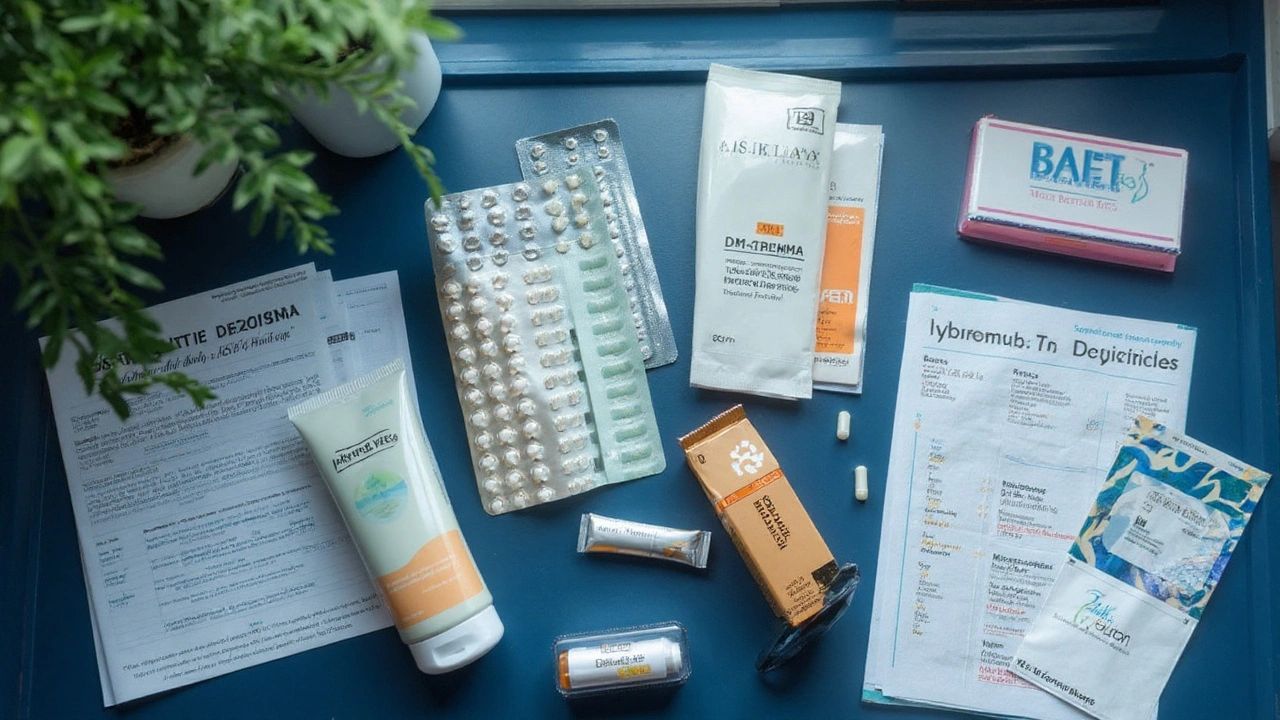
Health August 17, 2025
Tretiva (Isotretinoin) 2025: Uses, Dosage, Side Effects, and Safe Access
If you typed Tretiva because you want the straight facts-what it is, where to find the official leaflet, how to use it safely, and whether it’s right for your acne-this is the fast, no-nonsense guide you need. Tretiva is a brand name for isotretinoin capsules used for severe acne. It works brilliantly for many people, but it’s tightly controlled for a reason: pregnancy risks, blood and mood monitoring, and a very dry face and lips for a few months. I’ll show you the quickest way to the correct official pages, plus the practical steps doctors actually use so you don’t miss anything important.
Find the right Tretiva pages fast (official leaflets, safety updates, access)
You probably want one of four things: the official patient leaflet, trusted safety updates, how to get prescribed, or product details for your country. Here’s the shortest path without guesswork.
- If you need the official UK patient leaflet (generic isotretinoin capsules): search “isotretinoin capsules Patient Information Leaflet emc”. Then open the Electronic Medicines Compendium result for “Isotretinoin 10 mg/20 mg capsules - Patient Information Leaflet.” Use this to check dose, side effects, and what to do if you miss a dose.
- If you want NHS guidance on when isotretinoin is used for acne: search “NHS isotretinoin acne.” Open the NHS page that explains who can get it, expected timeline, and safety checks.
- If you’re in the UK and need the latest safety warnings: search “MHRA isotretinoin Drug Safety Update.” Look for MHRA Drug Safety Updates (2023-2024) about the Pregnancy Prevention Programme, mental health and sexual function warnings, and patient reminder cards.
- If you need the Indian brand leaflet for Tretiva: search “Tretiva 20 capsule package insert Intas” or “Tretiva PIL India.” Choose the manufacturer’s PDF or the leaflets hosted on India’s regulatory or pharmacy sites. Check the capsule strength on your blister (10 mg or 20 mg) and match it to the leaflet.
- If you’re in the US: search “iPLEDGE isotretinoin patient” for the FDA-mandated program. You’ll find the steps for pregnancy testing, monthly confirmations, and pharmacy pick-up rules.
Quick pointers by scenario:
- “I just need side effects and what to avoid.” Open the UK PIL via the emc result and read the “Possible side effects” and “Warnings and precautions” sections first.
- “I want to start treatment.” In the UK, ask your GP for a dermatology referral. Isotretinoin is usually started by a consultant dermatologist under the MHRA’s Pregnancy Prevention Programme.
- “I’m already on capsules and lost my leaflet.” Use the emc leaflet for your dose and country. Don’t rely on random forums for dosing or warnings.
- “I’m abroad with Indian stock.” Stay within your prescriber’s plan. If your box looks different, match the strength, batch number, and expiry, and read the local PIL you found via the search above.
What is Tretiva in simple terms? It’s isotretinoin-vitamin A-derived capsules that shrink oil glands, lower inflammation, unclog pores, and reduce acne bacteria indirectly. It’s usually used when acne is scarring, nodulocystic, or stubborn despite antibiotics and proper topicals. In the UK you’ll get “isotretinoin capsules” as a generic, not the Tretiva brand, but the drug and cautions are the same.

Uses, dosing, side effects, and safety rules (what doctors actually do)
You want quick, practical facts backed by real guidance. Here’s the medical backbone clinicians follow, pulled together from UK sources like the MHRA Drug Safety Updates (2023-2024), NHS advice, and dermatology dosing norms.
Who it’s for:
- Severe nodulocystic acne, acne with scarring risk, or acne that hasn’t improved after a proper course of oral antibiotics plus topical retinoid/benzoyl peroxide.
- Sometimes used for other follicular disorders by specialists, but acne is the main reason.
Who should not take it:
- Anyone who is pregnant or planning pregnancy within a month after stopping. It causes severe birth defects and miscarriage.
- People breastfeeding.
- Anyone taking tetracycline antibiotics (risk of increased pressure in the brain).
- People with allergies to isotretinoin or soya/peanut (many capsules contain soya oil-check your leaflet if you have a soya/peanut allergy).
- People taking high-dose vitamin A (risk of toxicity).
Core dose rules you’ll hear in clinic:
- Start around 0.5 mg/kg/day with food; adjust to 0.5-1 mg/kg/day depending on side effects and response.
- Aim for a total “cumulative dose” of roughly 120-150 mg/kg across the course. Many finish between 16-24 weeks. Some dermatologists use lower daily doses (e.g., 0.2-0.5 mg/kg) for longer if side effects are heavy, especially for adult female acne.
- Take with or after a meal to boost absorption; many generics absorb poorly on an empty stomach.
Monitoring you should expect:
- Pregnancy tests: two negative tests before starting (per programme), then monthly during, and one at least 5 weeks after finishing.
- Blood tests: liver enzymes and lipids at baseline, at about 1-2 months, then spaced out if stable. Your clinic may tailor this.
- Mood/mental health check-ins: you’ll get warnings and a plan for what to do if your mood shifts.
Common side effects (nearly everyone gets dry lips):
- Dry lips and skin, nosebleeds, dry eyes, sun sensitivity.
- Temporary flare in week 2-4 for some people (your clinic may pre-treat with anti-inflammatory steps).
- Blood changes: triglycerides and liver enzymes can rise.
Serious risks you must know:
- Teratogenicity: very high risk of severe birth defects with pregnancy exposure; strict contraception and monthly testing are mandatory.
- Mood and sexual function changes: rare but important. UK regulators (MHRA) require clear warnings and rapid action if symptoms appear.
- Visual changes, including reduced night vision (don’t drive at night if affected); very rare reports of hearing changes.
- Severe headache with nausea/visual changes-this can signal raised brain pressure. Stop and get urgent medical advice.
Simple do/don’t list that saves headaches:
- Do use bland moisturiser and lip balm from day one; SPF 30+ daily.
- Do keep alcohol low; it can push up triglycerides and stress your liver.
- Do not wax, epilate aggressively, or have dermabrasion/laser peels during treatment and for about 6 months after-higher risk of skin damage.
- Do not donate blood during treatment and for 1 month after.
- Do not take vitamin A supplements.
- Avoid contact lenses if eyes are too dry; switch to glasses if needed.
| What to monitor | When | Typical action thresholds | What usually happens |
|---|---|---|---|
| Pregnancy test (if of childbearing potential) | 2 tests before start, monthly during, and at least 5 weeks after stopping | Any positive test | Stop isotretinoin, urgent specialist review, discuss risks and options |
| Liver enzymes (ALT/AST) | Baseline, 1-2 months, then periodically if stable | Persistent ALT/AST elevation above reference range | Lower dose, recheck, or pause/stop depending on severity |
| Fasting lipids (triglycerides, cholesterol) | Baseline, 1-2 months, then periodically | Triglycerides >5.6 mmol/L (~500 mg/dL) or rapidly rising | Diet advice, alcohol reduction, dose adjustment, or pause/stop |
| Mood/mental health | At each review; sooner if changes | New or worsening depression, anxiety, self-harm thoughts | Stop the drug and seek urgent medical help; involve GP/mental health team |
| Skin and mucosa dryness | Daily self-care | Fissures, persistent nosebleeds, eye pain | Step up emollients, saline gel, lubricating eye drops; tell clinic if severe |
Numbers at a glance (why the strict rules):
- Birth defects risk with in‑pregnancy exposure is very high (major malformation rates reported around 20-35% in published cohorts), with more subtle neurodevelopmental issues reported too. This is why monthly testing and strict contraception are non-negotiable.
- Cheilitis (lip inflammation) happens to most people-plan for it from day one.
- Triglycerides can rise-more likely if you drink alcohol, have metabolic syndrome, or a family lipid disorder.
Drug interactions to avoid:
- Tetracyclines (doxycycline, minocycline): increased risk of benign intracranial hypertension.
- Vitamin A supplements: risk of toxicity (hypervitaminosis A).
- Topical keratolytics, waxing, or strong cosmetic peels: higher chance of irritation or injury.
How fast it works and for how long:
- Spots can flare in the first 2-4 weeks; real improvement usually shows by weeks 6-8.
- Many courses last 16-24 weeks; some need longer at lower daily doses.
- Relapse risks drop when you hit the cumulative dose target. If acne returns later, a second course is possible after review.

Use it safely: step-by-step plans, checklists, and what to do next
Here’s a clear, practical flow you can follow with your clinic. Adjust to local rules (UK: MHRA Pregnancy Prevention Programme; US: iPLEDGE; India: manufacturer and local regulator guidance).
- Before you start
- Confirm diagnosis and severity: photos, prior treatments, and any scarring risk.
- Discuss contraception: two methods (preferably a barrier plus a hormonal or long-acting method), starting at least 1 month before.
- Do two pregnancy tests as required before initiation (timing per your programme).
- Baseline bloods: liver enzymes, fasting lipids ± pregnancy test, as guided by your clinic.
- Review mental health history and supports. Agree on warning signs and who to contact.
- Pick skincare: bland moisturiser, lip balm (petroleum or lanolin-based), SPF 30+; saline nasal gel if nosebleeds tend to happen.
- Set dose plan: usually ~0.5 mg/kg/day with food to start.
- During treatment (monthly rhythm)
- Pregnancy test each month before your next supply if you could become pregnant.
- Review for dryness, eyes, nosebleeds, mood, night vision. Adjust dose if needed.
- Repeat bloods around month 1-2, then as advised.
- Stick to skincare and sun protection; avoid waxing and harsh cosmetic procedures.
- Keep alcohol low; add omega‑3 in diet if your clinician agrees (some people find it helps lipids/dryness).
- After you finish
- Final pregnancy test at least 5 weeks after the last capsule per programme rules (UK often advises 5 weeks).
- Do not get pregnant for at least 1 month after stopping.
- No blood donation for 1 month after.
- Delay waxing/dermabrasion/laser for ~6 months to reduce skin injury risk.
- Retain your clinic letter or summary of treatment (dose, dates, labs) for future care.
Quick decision help if something goes wrong:
- Mood crash, panic, suicidal thoughts: stop capsules and get urgent medical help. Tell your clinic and your GP the same day.
- Severe headache with vomiting or visual changes: stop and seek urgent care (possible raised intracranial pressure).
- Positive pregnancy test at any time: stop immediately and contact your prescriber urgently. You’ll get fast counselling on risks and options.
- Triglycerides jump high: your dermatologist may lower the dose, pause, or stop; diet changes and alcohol reduction help.
- Dryness unbearable: lower dose, add thicker moisturiser, humidify your room at night, and ask about short drug holidays if your clinic uses them.
Skincare cheat sheet that actually helps:
- AM: gentle cleanser, hydrating serum (glycerin/hyaluronic acid), moisturiser, SPF 30+ (zinc oxide or hybrid). Skip harsh toners.
- PM: gentle cleanse, moisturiser; add petrolatum on lips and corners of nose.
- Eyes: lipid‑based artificial tears if contacts feel scratchy; switch to glasses if needed.
- Body: urea 5-10% or lactic acid 5% lotions can help flakiness-patch test first.
If you can’t access isotretinoin yet, ask about these steps while you wait:
- Topicals: adapalene + benzoyl peroxide gel; clindamycin is best used short term with benzoyl peroxide to limit resistance.
- Orals: doxycycline or lymecycline (with a proper topical routine), max 3 months ideally.
- Hormonal options for females: combined oral contraceptives, or spironolactone if suitable; these can be very effective for jawline/adult acne.
Counterfeit and import cautions:
- Capsules should have clear batch numbers, expiry dates, and sealed blisters. If packaging or print looks off, don’t take it.
- Report suspected fake products via your national system (UK: MHRA Yellow Card scheme-search “Yellow Card report a medicine”).
- Stick to a prescription and a regulated pharmacy. Random online sources are a real risk with isotretinoin.
Why your location matters:
- UK: You’ll usually get “isotretinoin capsules” (generic) via a dermatologist under the MHRA Pregnancy Prevention Programme, plus a patient alert card and monthly safety checks.
- India: Tretiva is a common brand. Follow the brand PIL exactly and stay under a dermatologist’s care for tests and contraception guidance.
- US: iPLEDGE controls every dispense. Expect monthly confirmations and narrow pickup windows.
Credibility snapshot: The rules above reflect UK MHRA Drug Safety Updates (notably 2023-2024 changes around pregnancy prevention and mental/sexual health warnings), NHS isotretinoin guidance for acne, and long-standing dermatology practice on cumulative dosing and monitoring.
FAQ
Is Tretiva available in the UK?
Not as a brand. You’ll get generic “isotretinoin capsules.” The drug is the same, the safety rules are the same.
How long until I see results?
Many people see real changes by weeks 6-8. Full results usually come by the end of a 16-24 week course. Early flares can happen.
Can men take it?
Yes. Men don’t need contraception for themselves, but they still must not donate blood during treatment and for 1 month after, to avoid exposing a pregnant person to the drug.
Can I drink alcohol?
Keep it low. Alcohol can push up triglycerides and strain the liver. Your clinic will advise based on your blood tests.
Is low‑dose isotretinoin effective?
Lower daily doses over a longer period can work well with fewer side effects for some people. Doctors often use the cumulative dose target to guide the total exposure.
Can I take vitamins or supplements?
Avoid vitamin A. Run other supplements by your clinician, especially if they affect the liver or lipids.
Why can’t I wax or get laser?
Your skin is more fragile on isotretinoin. Waxing, dermabrasion, and some lasers can tear or scar skin during treatment and for months after. Patch test gentler options or wait it out.
What if I get pregnant while on isotretinoin?
Stop immediately and contact your prescriber urgently. You’ll get fast counselling on risks and options.
Next steps and troubleshooting
If you’re in the UK with severe acne and think isotretinoin is right for you:
- Book a GP appointment and bring photos of flares and scars. Ask for a dermatology referral for isotretinoin assessment.
- While waiting, start a consistent topical routine (adapalene + benzoyl peroxide), and note any side effects or improvements.
If you’re already on capsules and something feels off:
- Dryness out of control: reduce hot showers, add thicker emollients, use saline nasal gel, and ask about dose adjustments.
- Night vision worse or headaches: stop night driving and contact your clinic; seek urgent care if headaches are severe with nausea/visual changes.
- Blood test abnormalities: your dermatologist will guide dose changes or pauses; stick to follow-ups.
If your box says Tretiva but you live in a country that usually dispenses “isotretinoin capsules”:
- Double-check your prescriber approved the exact product. Match strength and dosing.
- Use the correct country leaflet (UK emc for UK products; Indian manufacturer leaflet for Indian products). Follow the stricter of the two safety rules if they differ.
If costs or access are a problem:
- Discuss alternatives or bridging therapy with your clinician (topicals, antibiotics, hormonal options), and ask about hospital schemes or waiting list support.
- Don’t buy from unverified sites-too risky for a drug with this safety profile.
If you only remember one thing, make it this: isotretinoin can clear acne when nothing else works, but it demands a checklist mindset-pregnancy prevention, bloods, mood checks, moisturiser, sunscreen, and honesty with your clinic. That’s how you get great skin with your health intact.
Write a comment
Items marked with * are required.






15 Comments
Nonie Rebollido August 23, 2025 AT 10:40
Just started this and my lips are already cracking 😅 thanks for the lip balm tip-already grabbing petrolatum.
Andy Smith August 24, 2025 AT 06:57
Important note: the iPLEDGE system in the U.S. is not just bureaucratic-it's life-saving. I've seen patients who skipped monthly checks and ended up in ERs with triglyceride levels over 2,000. Don't treat this like a cosmetic fix. It's a systemic drug with systemic risks. Follow the protocol. Period.
Rekha Tiwari August 24, 2025 AT 15:49
As someone from India who used Tretiva for 6 months-I’m so glad this guide exists! 🙌 The brand PIL from Intas is super clear, but I wish more doctors explained the ‘why’ behind the monthly blood tests. Also, PLEASE don’t skip the moisturizer-even if your skin feels ‘too oily’ at first, it gets worse before it gets better. I used Cetaphil + Vaseline on lips 24/7. No regrets. 🌟
Leah Beazy August 25, 2025 AT 18:19
I was skeptical but this actually helped me get my prescription faster. My dermatologist said I was ‘too young’ for it-until I showed her the NHS guidelines. Now I’m on week 8 and my skin looks like a different person. Also-yes, the dryness is real. But so is the confidence. You got this 💪
John Villamayor August 27, 2025 AT 08:48
For those asking about alcohol-yes it can spike triglycerides but I drank 2 beers a week and my levels stayed fine. Everyone’s different. Just get tested. Don't fear the numbers. Fear not knowing them.
Jenna Hobbs August 28, 2025 AT 10:26
Y’ALL. I almost quit because of the dryness. I cried in the shower. I thought I’d never look normal again. Then I found a humidifier and a $5 lip balm from Target. Four months later? My skin is smoother than it’s ever been. I’m not just healed-I’m glowing. This drug changed my life. Don’t give up before the magic happens.
Ophelia Q August 30, 2025 AT 01:39
My mom was terrified I’d get depressed. So we made a pact: every Sunday, we’d watch a dumb movie and I’d tell her how I felt. No pressure. No judgment. Just talk. I never had mood issues, but having that safety net made all the difference. ❤️
Marshall Pope August 30, 2025 AT 20:54
isotretinoin is the real deal but dont trust random forums. i lost my pil and started reading reddit advice and almost took 40mg a day instead of 20. my derm saved me. always go to emc or nhs or your local med site. no exceptions.
Elliott Jackson August 31, 2025 AT 05:29
Why do people act like this drug is some magical cure? I know someone who took it for 18 months, got terrible joint pain, and still broke out after. It’s not for everyone. The industry pushes it like a miracle because they profit. Do your own research. Question everything.
McKayla Carda September 1, 2025 AT 02:53
Don’t forget: no blood donation for a month after. I didn’t know and almost donated. Got a call from the center-they flagged it. Saved me from a nightmare.
Christopher Ramsbottom-Isherwood September 2, 2025 AT 04:20
Who says you need a dermatologist to start this? I ordered Tretiva from a trusted Indian pharmacy, used the PIL, tracked my labs myself with a home kit, and I’m fine. Regulation is overkill. People need autonomy.
Stacy Reed September 3, 2025 AT 20:56
It’s not just about acne, is it? It’s about control. About society telling you your skin is ugly. About wanting to be seen as worthy. I took this drug because I was tired of being invisible. And now? I’m not just clear-I’m free.
Robert Gallagher September 5, 2025 AT 05:33
Just got my first blood results-triglycerides up to 4.8. My doc said cut alcohol and add omega-3s. So I started eating salmon every day and switched to sparkling water. Two weeks later, down to 3.1. It’s not magic. It’s just discipline. And yeah, my lips are still dry. But I’m winning.
Agha Nugraha September 5, 2025 AT 19:10
Used Tretiva in Delhi. Same drug, same risks. The only difference? Here, the pharmacy gives you a little card with the PIL QR code. Super helpful. If you're abroad with Indian pills, scan that QR. It’s easier than Googling.
Howard Lee September 7, 2025 AT 14:46
For those worried about night vision: I drove at night for two weeks without issue. Then one rainy evening, I couldn’t see the brake lights ahead. I stopped driving after dark. No drama. Just caution. The risk is low, but it’s real. Listen to your body.